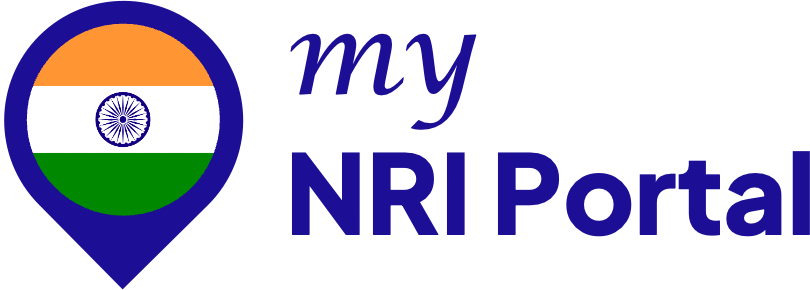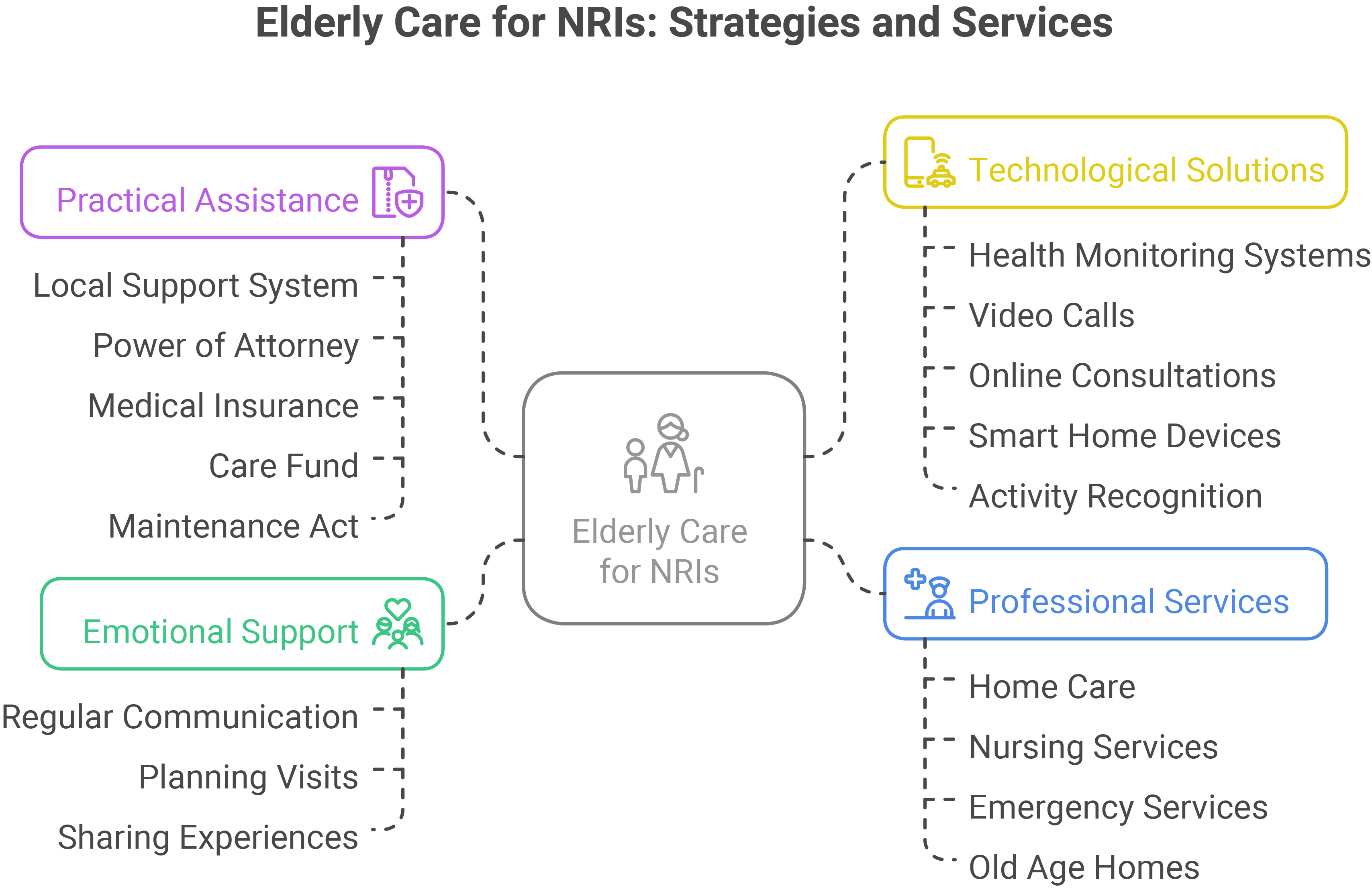
Parental Care
Caring for loved ones in India is a heartfelt concern for many NRIs. The distance often brings emotional challenges—especially when supporting elderly parents. But by identifying their needs and arranging the right support, you can ease the burden and bring peace of mind to everyone involved.
Elderly care from afar doesn’t have to be overwhelming. With the right approach, you can stay connected, offer meaningful support, and reduce the stress that comes with caregiving across borders. Here are some practical tips to guide you on this journey with confidence and compassion.
And remember—your emotional well-being is just as important as your parents’. A calm, supported caregiver is better equipped to provide lasting care from afar.
How to Provide Emergency Remote Services for Elderly Parents in India – A Complete Guide for NRIs
Distance doesn’t have to be a barrier to care. With proper planning, reliable services, and legal groundwork, NRIs can ensure their parents in India are safe, supported, and dignified—both in life and after.
Staying Connected Across Distances
- Regular Communication – Make it a habit to connect with your parents through calls, video chats, or messages. These simple but consistent efforts go a long way in closing the emotional distance. Share everyday stories, moments, and updates—it reinforces your presence in their lives and assures them they’re always in your thoughts.
- Planning Visits – Whenever possible, schedule visits to spend meaningful time together. These moments strengthen bonds and ease the guilt often felt by being far away. If visiting isn’t feasible, consider asking trusted friends or relatives to drop by and provide companionship.
Building Support Beyond the Immediate Family
- Sharing Experiences – You’re not alone. Connect with fellow NRIs facing similar challenges through online communities and forums. Exchanging tips and experiences not only brings comfort but also practical solutions from people who truly understand your situation.
- Creating a Local Support Network in India – Build a dependable network of relatives, neighbors, and professional caregivers around your parents. A strong local support system can provide essential assistance, emotional comfort, and act swiftly in times of need.
- Family & Neighbors: Identify close contacts who can be available for immediate help.
- On-Ground Caregivers: Engage trained home nurses or caretakers for daily support.
- Hospital Tie-ups: Pre-register parents with nearby hospitals for faster emergency admission.
Choosing the Right Professional Elderly Care Services
What to Look For
- Needs Assessment: Understand health, mobility, and companionship needs.
- Quality: Choose providers with trained staff and good reviews.
- Flexibility: Services should evolve with changing requirements.
- Cost: Balance affordability with quality of care.
Seeking help from professional senior citizen support services
Key Considerations for Selecting Elderly Care Services:
- Assessment of Needs: Understanding the specific needs of your elderly parents is the first step. Consider their medical conditions, mobility issues, and the level of companionship and daily assistance they require.
- Quality of Care: Ensure that the care providers are reputable, with well-trained staff who can offer compassionate and professional support.
- Flexibility: The chosen service should be flexible enough to adapt to the changing needs of the elderly.
- Cost: While quality of care is paramount, the services should also fit within your budget.
Daily / Regular Operational support:
- Doctor’s Appointment & helping for check-up, procurement of medicines etc.
- Pre-scheduled Hospitalization and post-hospitalization help
- Utility Bill Payment (Elec Bill / Tel Bill / Gas bill /Tax Bill etc.)
- Shopping (Veg / Grocery / Household Items)
- Accompanying to places asrequired
- Home Visits for sundry needs
- Bank / Post Office / Mediclaim / other official jobs
- Market Research for any third-party service or commodity
- Event Facilitation
- Caretaking of flats/apartments with regular maintenance and cleaning
- Personal grooming – forhair cut, salon etc.
- Coordination with Caregiving organisations if needed
- Caretaking of flats/apartments with regular maintenance and cleaning
Elderly Care Services:
- Home Care – Personalized care provided at the elderly’s home, including assistance with daily activities, medication management, and companionship. Promotes independence, comfort, and personalized attention.
- Nursing Services – Professional medical care by qualified nurses, including wound care, injections, and health monitoring. Ensures professional medical attention and peace of mind for family members.
- Emergency services – In case of medical emergencies, ambulance services for taking patient immediately to the identified group of hospitals.
- Old age homes – NRIs may choose to shift the parents to paid old age homes where all the necessary requirements of the parents would be taken care of.
Leverage Technology
- Enhanced Safety and Well-being: Technology provides NRIs with tools to ensure the safety and health of their elderly parents, offering solutions that range from emergency response to daily health monitoring.
- Emotional Connectivity: Despite physical distances, tech-enabled care helps maintain strong emotional bonds between NRIs and their parents, ensuring they feel loved, cared for, and connected.
- Autonomy for the Elderly: With tech solutions designed to support independent living, seniors enjoy a sense of autonomy and dignity, crucial for their mental and emotional health. Cost-Effective Care: By reducing the need for frequent hospital visits and enabling early detection of health issues, technology can significantly lower the costs associated with elderly care.
- Some technology solutions that you could look at are:
- Wearables (e.g., BP, heart rate, fall detection).
- Emergency Alerts: get Mobile SOS buttons or panic devices.
- Home Monitoring: Install CCTV cameras, motion sensors, and smart alarms.
- Daily Health Apps: Use health monitoring solutions to track wellbeing remotely.
Legal Preparedness (For Seamless Remote Management)
Ensuring the right legal setup allows you to act quickly and responsibly in your parents’ best interests.
- Power of Attorney (PoA)
-
- Assign a General or Medical PoA so you (or a trusted contact) can manage finances, health decisions, or property.
- Get it registered in India for validity—can be initiated from abroad through the Indian consulate.
- Will and Estate Planning
-
- Encourage parents to draft a will to avoid disputes and ensure asset distribution as per their wishes.
- Register the will with a notary or sub-registrar office.
- Living Will / Advance Directive
-
- A document specifying medical preferences (life support, resuscitation, palliative care) in terminal conditions.
- Helps doctors and caregivers make choices aligned with your parent’s values.
- Nomination on Financial Accounts
-
- Ensure your parents have nominated someone on all key accounts—bank, insurance, property—to simplify access.
- Maintenance and Welfare of Parents and Senior Citizens Act (2007)
-
- Legally mandates children to support their elderly parents.
- If neglected, parents can approach a tribunal to claim maintenance.
Emergency Protocols
- Dial 108 – Free emergency helpline across India (ambulance, police, fire).
- Set Local Emergency Contacts – Ensure local caregivers and hospitals are pre-informed.
- Telehealth Options – Use platforms like Practo or Tata Health for instant doctor access.
- Medical Document Access – Keep scanned health records in cloud storage (with your access).
End-of-Life Support (With Dignity and Sensitivity)
In an unfortunate event when facing a loss from afar, reliable services ensure your loved one receives respectful final rites:
Funeral and Last Rites Services
These services offer:
- Ambulance and priest arrangements
- Materials for rituals
- Death registration help
- Virtual rites via livestream
- Post-cremation services (Asthi visarjan, pind daan)
- Obituary publications
Some Providers:
Repatriation of Mortal Remains (If Abroad)
If a parent passes away overseas:
- Notify Indian Embassy/Consulate
- Prepare Documents: Death certificate, embalming certificate, passport, NOC.
- Clear Health Checks: Ensure packaging meets WHO/public health guidelines.
- Arrange Transport: Via airline or funeral service provider.
- Use eCARe Portal: eCARe MoHFW for streamlined online clearance.
Summary Checklist for NRIs
Tasks:
- Enroll in elder care service
- Establish Power of Attorney
- Maintain care & emergency fund
- Create a living will & estate plan
- Register with local hospitals
- Set up emergency & routine contacts
- Use health apps & monitoring devices
- Pre-arrange funeral services if needed

